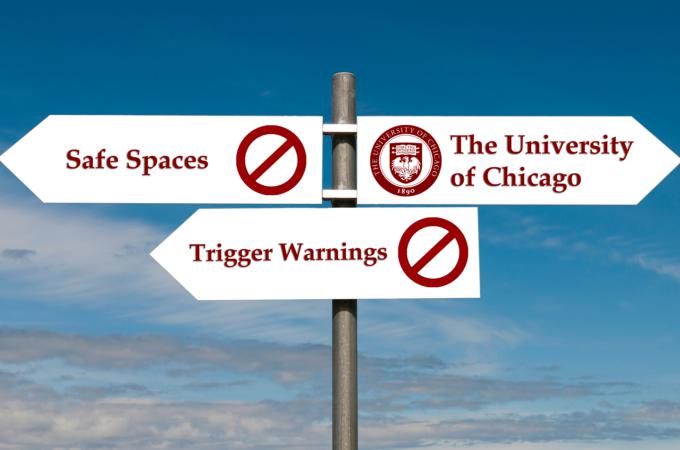Nothing truly different from Chicago
Last week the internet community of social conservatives and libertarians was abuzz over a letter from a Dean at the University of Chicago, Jay Ellison, to incoming students. "Members of our community are encouraged to speak, write, listen, challenge and learn, without fear of censorship. ... Freedom of expression does not mean the freedom to harass or threaten others. ... Our commitment to academic freedom means that we do not support so-called 'trigger warnings,' we do not cancel invited speakers ... and we do not condone the creation of intellectual 'safe spaces' where individuals can retreat from ideas and perspectives at odds with their own."
At last, tough old University of Chicago was leading the way among elite universities by bucking the tide of political correctness! -- or so the narrative went.
Problem is, almost nothing about the dean's letter was true. It turns out the University of Chicago does condone "safe spaces." In fact, Dean Ellison himself is a leading member in the "Safe Space Alliance" at the university and places a "Safe Space" decal on his office door to proclaim it. Also, the university does "support" trigger-warnings, in the sense that it raises no objection to the many professors who include trigger warnings in their class materials. The university's own website for sexual harassment complaints, umatter.chicago.edu, features as a prominent "trigger-warning" a floating window that enables users of the site to escape immediately if they wish. (Go see it for yourself.)
And the dean's letter side-stepped, really, the most important question for administrators at the University of Chicago as regards free expression: Will they discipline students who disrupt scheduled events? Twice during the last year University of Chicago students shouted down a visiting speaker -- one for being too favorable towards Israel, the other for not supporting the position of Black Lives Matter. In response, the university rather lamely convened a Committee on University Discipline of Disruptive Conduct, tasked with re-examining a System on Protest and Dissent dating back to 1976 which the university says "saw little use due in part to cumbersome procedures." Note in any case the dean's letter says merely that "members of our community"-- not visitors! -- are free to speak without harassment.
I suspect Dean Ellison was caught off guard when his letter went viral. As a relatively lowly Dean of Students, he has no authority to set university policy. His letter was not sent to students separately, to make a point on its own, but was merely a cover letter for another dean's pamphlet on the history of free expression at the University of Chicago. And his language about "safe spaces" and "trigger warnings" merely copied page 10 of that pamphlet.
No matter, social conservatives, desperate for some crumb in the face of political correctness, or perhaps, more craftily, wanting to exploit the letter in order to pressure the university from the outside, did no investigation into the letter's merits. They so lionized Dean Ellison as a defender of all that is right and true, that the Wall Street Journal a few days later, in an editorial praised Chicago's defense of free speech, and printed an op-ed on the theme from the university's President, Robert Zimmer.
In his piece, a defense of free speech in education, Zimmer wisely avoids criticizing "safe spaces" and "trigger warnings." He says nothing about disciplining disruptive students. And what he does say rings hollow and flat. One fears that here is yet another university president who has no wise views about undergraduate education. "The purpose of a college education," he writes, is for students to "change the trajectory of their families," "master how to recognize complexity," and "realize that actions inevitably have multiple implications." If there is such a thing as psycho-babble, this president speaks edu-babble, "Productive and informed questioning involves challenging assumptions, arguments and conclusions." And so on and so on.
What has gone wrong here? I submit that Chicago has lost its way and, a sign that this is so, is that it invokes only half of its history. The pamphlet which Dean Ellison wanted everyone to read celebrates how the University of Chicago was originally founded in imitation of the great German research universities of the late 19th century. This is true and laudable, but those great universities -- as Blessed John Henry Newman astutely observed at the time -- are good models for graduate education solely. They cannot establish a culture, pass on an admirable tradition, and through the medium of "personal influence" provide an education for the whole person. Newman argued that for these tasks an undergraduate college on the old model of Oxford and Cambridge is needed, and he is surely right. A research university can get by using "free speech" as just about its sole principle. A college implies a shared embrace of common truths which are not "questioned" in the senses of doubted, but "questioned" in the sense of examined and plumbed. What we call political correctness is a virulent and false mimicry of the culture of a college, when its authentic realization is absent.
The University of Chicago was saved for most of its history from being merely a research university through the fabled Great Books pedagogy of Robert Maynard Hutchins, which cherished and conveyed the best of the inheritance of Greece, Rome, and Jerusalem. To convince yourself that that core is no more, it is enough to visit Chicago's webpage on its current "core."
- Michael Pakaluk is Professor of Ethics and Social Philosophy in the Busch School of Business at The Catholic University of America. His book on the gospel of Mark, ‘‘The Memoirs of St. Peter,’’ is available from Regnery Gateway.



















